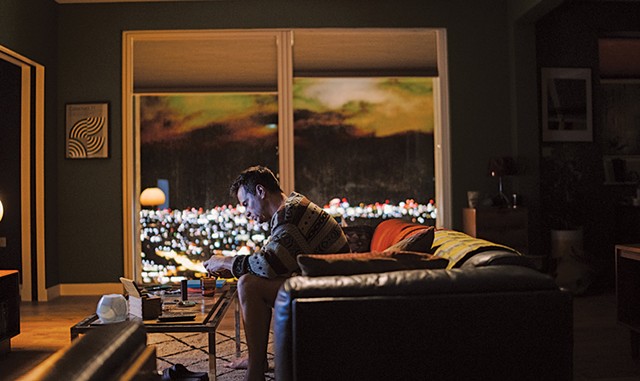
- Courtesy Of Chris Harris/Searchlight Pictures
- Andrew Scott plays a writer who finds an unusual way to heal his inner child in a powerful, fantasy-tinged drama.
Fans of "Fleabag" know Andrew Scott as the "hot priest," but the actor demonstrates that his appeal transcends the physical realm with his Golden Globe-nominated performance in All of Us Strangers. The new drama from director Andrew Haigh (45 Years, "Looking") is loosely based on Taichi Yamada's 1987 novel Strangers. Catch the film that squeezed tears from jaded festival audiences at Merrill's Roxy Cinemas in Burlington.
The deal
Writer Adam (Scott) is working on a screenplay about his 1980s childhood, listening to bands of the era such as Pet Shop Boys and Frankie Goes to Hollywood in his London tower block. The building appears to have just one other resident, a younger man named Harry (Paul Mescal). One night he shows up at Adam's door — drunk, distraught and seeking company.
Unsettled by Harry's clumsy advances, Adam turns him away. But later, as they come to know each other better, the two begin a tentative romance.
Meanwhile, on a research trip to his former home in the suburbs, Adam encounters his parents (Jamie Bell and Claire Foy), who have been dead since he was 12. Now younger than their own son, these spectral presences are eager to get reacquainted and learn all about Adam's adult life. As Adam shows them parts of himself he couldn't as a kid, he reopens wounds that never quite healed.
Will you like it?
A ghost story has always been a clever hook on which to hang a tale of unfinished emotional business, and All of Us Strangers doesn't waste any time on the whys and hows. The matter-of-fact reappearance of the dead here is reminiscent of 1990's Truly Madly Deeply or 2022's Aftersun — which, like this film, could be said to take place partially in a dream theater of grief.
Adam's reunion with his parents is fantastical and ordinary at once. We initially see them as lurking presences, like blurry memories, but they quickly solidify and welcome their son home as if there were nothing final about the long estrangement.
Are these scenes "real" within the film's world, or do they take place inside Adam's head, a metaphor for his struggle to process past trauma through his writing? We don't know, and soon we don't care, because the performances are so gripping and the interactions so raw and relatable.
Foy radiates warmth and charisma as Mum (the parents are never named); at first, she dominates the family scenes. But then Adam comes out to her, something he couldn't do during her lifetime, and Mum recoils. In an all-too-'80s way, she couches her discomfort with Adam's sexuality in fears for his welfare. It's Dad, despite his stoic masculine exterior, who turns out to be more understanding.
In a recent essay for the Los Angeles Times, Haigh said he's long wanted to make a film about "growing up gay in the 1980s ... and how that experience haunts many of us like a ghost." Rather than trying to represent a broad swath of experience, he embraced "specificity" — to the extent of shooting parts of the movie in his own childhood home.
While Adam and Harry's romance is compelling in its own right, their scenes also give Haigh (who wrote the script) an opportunity to explore the subtle differences between generations of gay men. The millennial Harry has been out to his parents for most of his life, something Adam can only dream of. But Harry still feels alienated — pushed to the edge of his family, as he puts it.
The two men meet on the common ground of loneliness, struggling to forge a meaningful connection through frenetic clubbing sessions followed by long bedroom conversations. It's rare these days to find a filmmaker who takes romance seriously, in its pain and awkwardness, as well as its passion and comfort. But Haigh is just that, as he already showed with Weekend (see sidebar). In Scott and Mescal (who starred in the equally unvarnished romance "Normal People"), he has two actors who are capable of conveying not just chemistry but genuine emotional intimacy.
With only four real characters, All of Us Strangers generates a veritable furnace of feeling. Not for nothing does fire imagery appear throughout as a counterpoint to the sterile blues of Adam's high-rise apartment, with its lofty view of the city. The desolation of the urban setting creeps up on the characters, threatening their fragile bonds.
Any viewer who has experienced depression or unresolved family issues is likely to connect to aspects of All of Us Strangers. Many will leave the theater in tears — or debating the ending, which brings everything together in a way that may not work for everyone. But no one can deny the power of the motive that fuels Adam's exploration of his past — a dream of finally opening up to love in all its messy, human glory.







Comments
Comments are closed.
From 2014-2020, Seven Days allowed readers to comment on all stories posted on our website. While we've appreciated the suggestions and insights, right now Seven Days is prioritizing our core mission — producing high-quality, responsible local journalism — over moderating online debates between readers.
To criticize, correct or praise our reporting, please send us a letter to the editor or send us a tip. We’ll check it out and report the results.
Online comments may return when we have better tech tools for managing them. Thanks for reading.